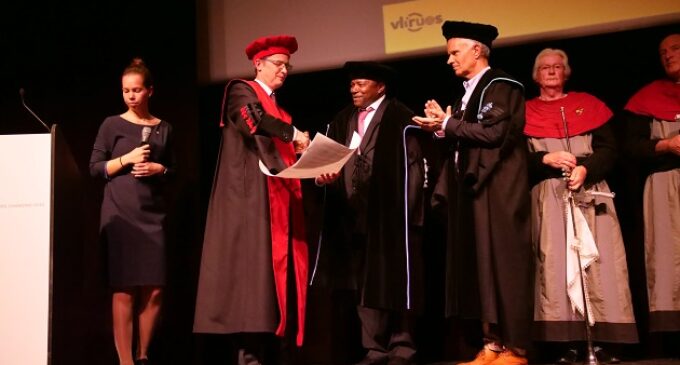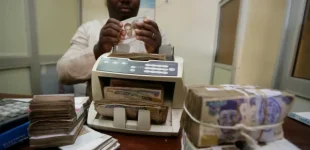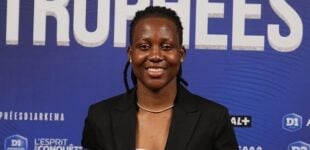The Congolese who brings laurels to Nigeria

May 15, 2019 was a day to remember for the Katholieke Universiteit Leuven – Ku Leuven – a research university in the Dutch-speaking town of Leuven in Flanders, Belgium. Ku Leuven is one of Europe’s oldest universities, a university which, from renaissance philosophy to cutting-edge nanotechnology, boasts a long tradition of ground-breaking research and high-quality education. It conducts teaching, research and other academic services in the areas of sciences, engineering and even in humanities, medicine, law, as well as social sciences. Ku Leuven is ranked among one of the 50 universities in the world.
On this day, one of its alumni who is making waves in one of the most populous countries in the world, Nteranya Sanginga, was chosen by the university for a honourary doctorate degree award. Sanginga, the first African Director General of the globally-acclaimed International Institute of Tropical Agriculture, (IITA), 65 years old, is an acclaimed microbiologist who hails from the Democratic Republic of Congo (DRC) and who has been living on the sleepy outskirts of Ibadan, capital of Oyo State for upto 30 years now, including the few years he went for his doctoral studies.
Ku Leuven’s hall was filled to the brim. The event was attended by professors and academics who had come to witness the recognition of an alumnus of the university who had made good in his endeavor. The academics gathered were all decked in gowns of Ku Leuven that ranged from black to grey robes with black or red caps, excluding the honoree who was decked in black academic gown, a black academic cap over a blue suit and white shirt. In his opening address, the Rector of Ku Leuven, Lucas Sels, commended IITA under Sanginga for “its consistent attention to capacity building and agricultural research” and “charismatic leadership in giving IITA a significant boost without compromising technological integrity and visionary commitment to tackling youth unemployment in Africa.’
In his acceptance speech, Sanginga traced the history of his decision to study agriculture to a time when there was conflict between Rwanda and DRC. He also itemized all the interventions between IITA and Ku Leuven which have significantly benefitted the Nigerian-based institute.
From a very humble background in DRC, Sanginga attributed his knack for agriculture to his upbringing by his mother. “I was born in Bukavu (in what was then still known as Belgian Congo, now DRC.). I spent every free moment helping my late mother in the field. She couldn’t afford to pay someone to help her weed and harvest. It made a deep impression on me that, all these years, she was feeding us with her own-grown manioc, corn, and beans. So it wasn’t a coincidence that I decided to study agriculture science at the university. In those days, our crop yields were declining, probably because of erosion and a lack of good plant varieties. Food security was becoming a huge problem in Congo. Agriculture played a crucial role in this respect, and I wanted to contribute to finding solutions,” he said.
The solutions he was primed by providence to provide could not be contained on the borders of DRC. Nigeria was later to become the seat where Sanginga’s expertise and know-how were funneled to the globe. A prolific academic, Sanginga has published his research materials and findings in over 120 papers in renowned journals which were basically ground-breaking contributions that focused on particular emphases on more sustainable ways of cultivating soy. In doing this, Sanginga’s researches also have a sub-focus which is on soybean varieties that possess more leaves and roots than the GMO from multinationals. He told Ku Leuven News, the university’s academic newspaper: “When these leaves and roots are left on the field after the harvest, they enrich the soil with nitrogen, thus yielding a heavier crop when, for instance, you grow corn there afterwards.”
Sanginga graduated as an agricultural scientist from the Faculte des Scientes Agronomiques, Yangambi, in 1977 and came to Nigeria’s IITA where he worked in jobs ranging from a PhD student, scientist, to project coordinator, from 1989 to 2002. He thereafter left for Kenya in 2002 where he worked as Director of CIAT-TSBF, an institute for tropical soil biology and fertility, from 2003 to 2011, before coming back to Nigeria in 2011 to assume the position of IITA’s first African Director General. Between working for IITA at his first coming to Nigeria, Sanginga decided to do his doctoral in Ku Leuven where he obtained a PhD in 1985, as a collaborative engagement between the university and the world-renowned research institute, specializing in microbiology and nutrition, with a dissertation that focused on these subjects.
Of this intervention by Ku Leuven, Sanginga said: “I obtained my PhD as part of collaboration between IITA and KU Leuven. I remember very well what it was like to first set foot on Belgian soil. It was the start of many inspiring collaborations and decades of friendship with colleagues such as Roel Merckx (now a professor of soil fertility at Ku Leuven).”
Sanginga is reputed to have redrawn the map of African competence and capability in managing and changing the status-quo of a ran-down concern. By the time he took over the running of IITA, the institute had been ran aground by his American predecessors and was only reluctantly posted to man the institute. Those who interviewed him for the job probably believed IITA’s lot would soon turn for the worse. But in less than eight years, IITA has more than quadrupled in ranking, infrastructural-wise and developmentally. This and many more were the reasons Ku Leuven chose him for recognition as an alumnus and an achiever.
Ku Leuven News said this of Sanginga: “Malnutrition, global warming, youth unemployment: no challenge is too daunting for Nteranya Sanginga. The acclaimed Congolese microbiologist has been raising agricultural policy in Africa to a higher level for many years.”
One of the ways Sanginga benefits Nigeria from these verdant researches was in convincing farmers in Northern Nigeria to invest in this mode of soil improvement, taking them on explanations that by so doing, they would access soy that generates instant profit when used to make tofu or soy milk. The improvement that Sanginga’s IITA has made in this regard since 1989 is phenomenal in terms of crop improvement. On September 7, 2018, IITA, through Sanginga, was awarded the Africa Food Prize by the African Green Revolution in Agriculture (AGRA) in Kigali, Rwanda. President Olusegun Obasanjo and other African leaders like Paul Kigame of Rwanda were on hand to hand Sanginga the prize.
The AGRA award is in recognition of individuals and institutions who exemplify themselves by “leading the effort to change the reality of farming in Africa from a struggle to survive to a business that strives.” IITA got a prize of US$100,000 therefrom as a celebration of “Africans who are taking control of Africa’s agriculture agenda. It puts a spotlight on bold initiatives and technical innovations that can be replicated across the continent to create a new era of food security and economic opportunity for all Africans.”
“We recently took things one step further with STEP (Start Them Early Program), which aims to convince children from primary and secondary schools that agriculture is the future. What do we see? Ten per cent of the STEP children choose to pursue further studies in agronomy. With IITA, we recently received the first African Food Prize. I want to use the 100,000 dollars in prize money to expand STEP to dozens of new schools,” Sanginga said upon reflection.
“We were able to improve manioc, bananas, and corn with protein and vitamins. That is highly necessary because 40 per cent of the African population is still malnourished today. That is mainly a problem for children under ten because it disrupts their cognitive development. So it’s easy to see why I’ve been working on this for the past 30 years. And with success, luckily. For one thing, since 2016, we’ve lifted over 4.3 million Africans out of poverty with an IITA project about improved agricultural techniques,” Samginga said of his strides at IITA.
On resumption in 2011, he met huge debt burdens. Not sure of his ability, the institute’s establishment sent the first tranche of auditors to audit him in his first few months of directorship but was astonished at his prudence and resourceful management. Not only was he able to sort out all the debt profiles of the institute, in a short while, he got its budget on its foot again and more instructively, has been securing very huge budgets for the institute ever since. One of the prime sources of IITA’s funding comes from the African Development Bank (ADB) headed by Nigeria’s former Minister of Agriculture, Akinwunmi Adesina which was enamored of Sanginga’s ENABLE Youth Initiative pioneering programme and began partnership with IITA in this regard some seven years ago.
“I called it the Youth In Agribusiness (YIA) programme because it encourages young ‘agripreneurs’. I’m truly passionate about young people; I spend a lot of time meeting and training them. After all, they are the potential driving force behind a change in mindset. Most African young people have long considered agriculture to be synonymous with poverty or struggling to get by. With YIA, we prove that this doesn’t have to be the case. We introduce them to better crops, techniques, and equipment, and we show them good practices, including those in the processing industry linked to agriculture. Young people tend to forget about that industry,” he said.
On how the crop improvement technique has worked out even under the threat from climate change, Sanginga said, “In areas where the population is increasingly facing extreme weather conditions – ranging from droughts to floods – we help the farmers by introducing crops that are more resilient against extreme weather and more resistant against new diseases that keep striking. We also inform them about optimal sowing times and crop combinations. All these are to ensure that the existing plots yield enough crops so that the farmers don’t start using nature reserves. This way, we’re actively fighting deforestation.”
 Climate change, in the opinion of Sanginga, is a huge problem for Africa and this is due mainly to African leaders’ ignorance of its effects. “Most African scientists and farmers are well aware of the impact of climate change, but most politicians don’t invest in sustainable agriculture. The knowledge and support for farmers are a thousand times bigger in Europe, but I’m optimistic. During Emmanuel Macron’s recent visit to Kenya, President Kenyatta – to my surprise – delivered a convincing speech about climate change. So it is very useful to keep educating African politicians, as I have been doing for quite some time now,” he said.
Climate change, in the opinion of Sanginga, is a huge problem for Africa and this is due mainly to African leaders’ ignorance of its effects. “Most African scientists and farmers are well aware of the impact of climate change, but most politicians don’t invest in sustainable agriculture. The knowledge and support for farmers are a thousand times bigger in Europe, but I’m optimistic. During Emmanuel Macron’s recent visit to Kenya, President Kenyatta – to my surprise – delivered a convincing speech about climate change. So it is very useful to keep educating African politicians, as I have been doing for quite some time now,” he said.
Many people have sought to divine why an African like Sanginga is harvesting tremendous goodwill in a global concern, a feat that is alien to Africans working on the soil of Africa. Many attribute his string of successes to his enormous charisma and his African roots – which, paradoxically, is an albatross to many an African head of such institutes. Sanginga is on first contact with many African government leaders who ask him to fix their agricultural headaches. To this, Sanginga admits, “They ask (for) my advice in Togo, Ghana, Benin, and soon, I’ll be setting up a programme in the DRC at the President’s request. I’m very pleased to have been the first to establish a business incubator for agricultural companies and to have adjusted the IITA strategy in such a way as to help change the direction of agriculture on our continent.”
Sanginga’s enthusiasm of what IITA has been able to achieve with the programme is infectious: “The success of YIA and STEP is probably what I’m most proud of. Our programmes are real weapons against the extremely high youth unemployment rates on our continent, and we can help to ensure that Africa’s surging young population does not become a burden but an asset.
“Take Noël and Christelle, for instance; two young Congolese citizens who we trained in fish production here at IITA. They went on to build 54 fish-breeding ponds for tilapia and catfish in Bukavu. Eighteen youngsters are now in their employment, and even the governor buys his fish there. In the future, the honorary doctorate from KU Leuven will make me even more convincing to hard-working people like them. I had not expected to get it at all, but I can use it to prove what I’ve always believed: the sky is the limit.
“Collaborations between advanced universities such as Ku Leuven and African institutions are so useful. I want to encourage Belgian students to keep coming here to do research. This continent will become indispensable for the future of agriculture and offers many opportunities, including ones for European investors,” he said excitedly.
The IITA DG takes a bird view of the strides of his office and its impact on Africa in general and is optimistic that a change is coming the way of the continent: “I am optimistic. Science is advancing, and young people are throwing all their energy into the fray. Last year, a student supervised by Roel Merckx and myself obtained her PhD. Words can’t describe how proud we were. It was one of those times when I felt I can make a difference. It’s draining to be on a plane every two weeks, on my way to yet another meeting, but when I see the return on investment, it’s all worth it.”
How does Sanginga unwind, bearing in mind his busy schedule and frequent travels all over the world? “I’m careful to maintain the balance between body and mind by playing squash almost every day. I used to be the Captain of Congo’s national soccer team. That not only gave me the unique opportunity to take part in championships, it also taught me how to manage a team.
“Everything starts with humility. You have to listen, especially to the lowest in rank. Our conceptual basis at IITA is solid because we talk a lot with the farmers themselves. Our scientists are approachable; they don’t make you shake in your knees, which is the effect some Belgian professors used to have on me. That’s why I wanted to do my PhD at IITA, and why I turned down offers from the universities of Liège and Minnesota. It made people laugh at me, but my training at IITA was exceptional. The approach here is very international – we have 43 nationalities at the moment – and that widened my outlook on the world for good. That is still what motivates me the most,” Sanginga concluded.

















There are no comments at the moment, do you want to add one?
Write a comment